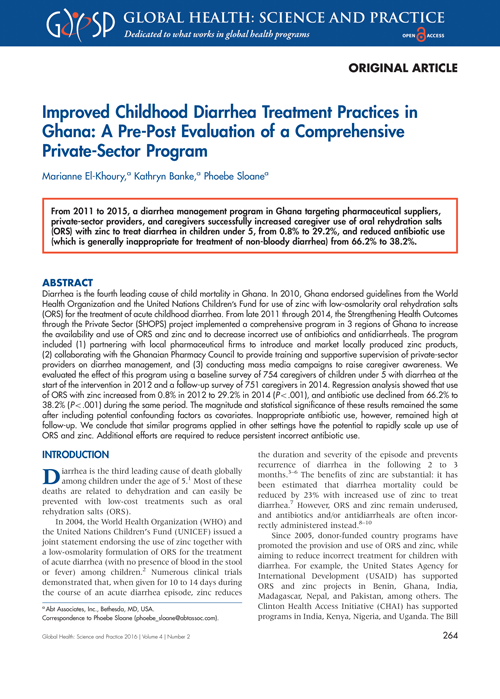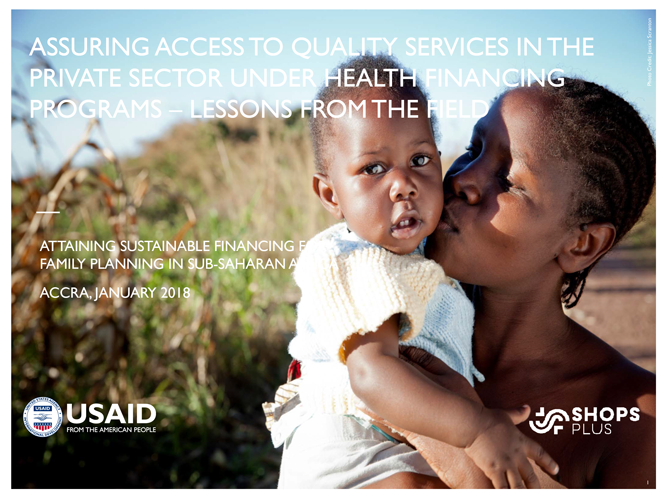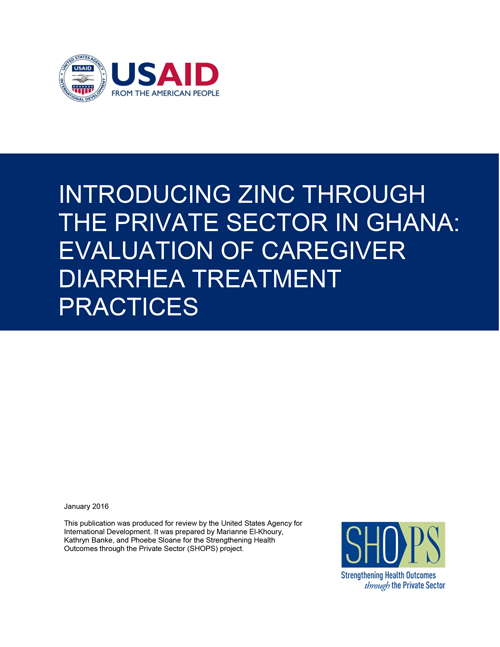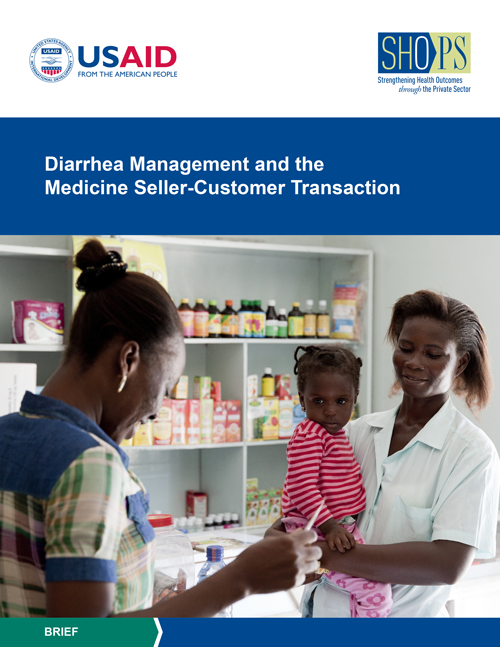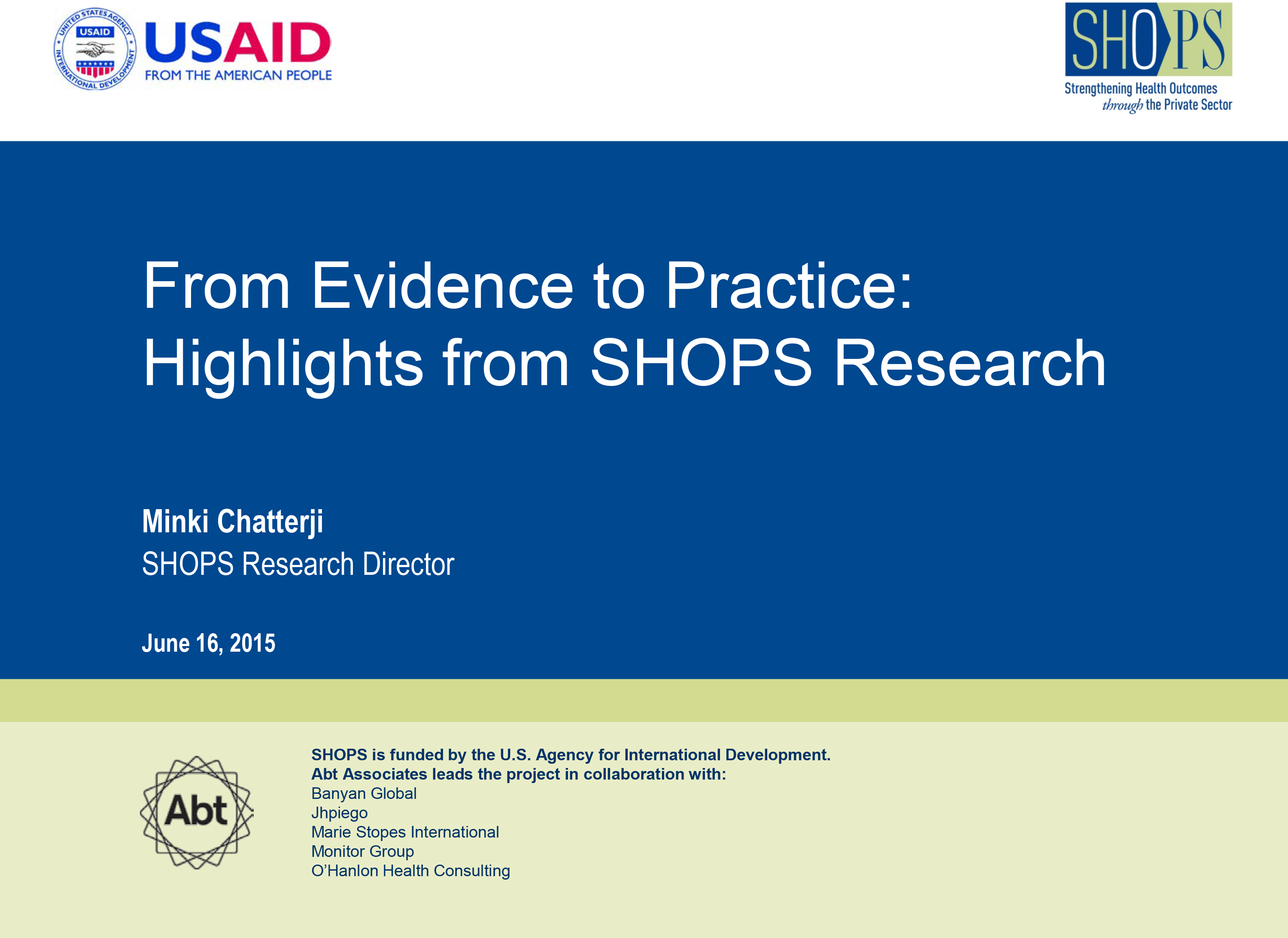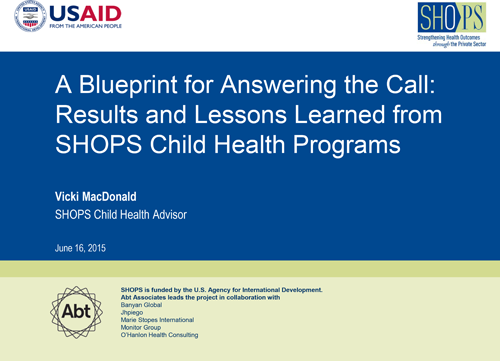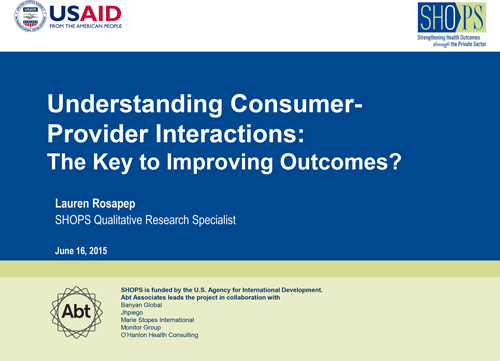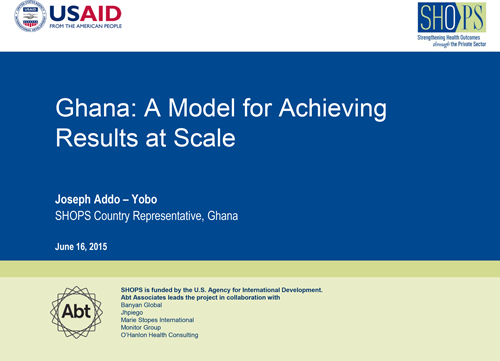
Resource Library
Sources for Sick Child Care in Ghana
The public sector is the primary source of care in Ghana; however, care-seeking patterns vary by socioeconomic status. Understanding if and where sick children are taken for care is critical to improve case management interventions. This brief presents a secondary analysis of the 2014 Ghana Demographic and Health Survey to examine where treatment or advice is sought for sick children who experience at least one of three treatable illnesses: fever, acute respiratory infection, or diarrhea. These illnesses represent some of the leading causes of death in children under five years old.
Resource Type : Brief
Country : Ghana
Year : 2018-06-01T01:00:00
Language : English
Project : SHOPS Plus

Resource Library
Improved Childhood Diarrhea Treatment Practices in Ghana: A Pre-Post Evaluation of a Comprehensive Private-Sector Program
Diarrhea is the fourth leading cause of child mortality in Ghana. In 2010, Ghana endorsed guidelines from the World Health Organization and the United Nations Children’s Fund for use of zinc with low-osmolarity oral rehydration salts (ORS) for the treatment of acute childhood diarrhea. From late 2011 through 2014, the Strengthening Health Outcomes through the Private Sector (SHOPS) project implemented a comprehensive program in 3 regions of Ghana to increase the availability and use of ORS and zinc and to decrease incorrect use of antibiotics and antidiarrheals. The program included (1) partnering with local pharmaceutical firms to introduce and market locally produced zinc products, (2) collaborating with the Ghanaian Pharmacy Council to provide training and supportive supervision of private-sector providers on diarrhea management, and (3) conducting mass media campaigns to raise caregiver awareness. We evaluated the effect of this program using a baseline survey of 754 caregivers of children under 5 with diarrhea at the start of the intervention in 2012 and a follow-up survey of 751 caregivers in 2014. Regression analysis showed that use of ORS with zinc increased from 0.8% in 2012 to 29.2% in 2014 (Po.001), and antibiotic use declined from 66.2% to 38.2% (Po.001) during the same period. The magnitude and statistical significance of these results remained the same after including potential confounding factors as covariates. Inappropriate antibiotic use, however, remained high at follow-up. We conclude that similar programs applied in other settings have the potential to rapidly scale up use of ORS and zinc. Additional efforts are required to reduce persistent incorrect antibiotic use.
This article was published in Global Health: Science and Practice, Volume 4, No. 2, pages 264-275.
Resource Type : Other
Country : Ghana
Year : 2016-06-01T00:00:00
Language : English
Project : SHOPS Plus

Resource Library
Assuring Access to Quality Services in the Private Sector under Health Financing Programs: Lessons from the Field
This presentation includes lessons from the field in ensuring financing for and access to quality private sector family planning services. It was presented during a panel discussion facilitated by Joseph Addo-Yobo of SHOPS Plus in January 2018. Representatives from Vodaphone, Bayer Pharmaceutical, and the DRC Ministry of Health shared key insights. The presentation was part a USAID-funded regional workshop in Accra, Ghana held in January 2018, “Attaining Sustainable Financing for Family Planning in Sub-Saharan Africa.”
Resource Type : Presentation
Country : Ghana
Year : 2018-02-01T15:50:00
Language : English
Project : SHOPS Plus

Resource Library
Introducing Zinc through the Private Sector in Ghana: Evaluation of Caregiver Diarrhea Treatment Practices
Recognizing the substantial role of the private sector in providing treatment for pediatric diarrhea in Ghana, the SHOPS project partnered with the public sector to design and implement a set of interventions to introduce zinc through private sector channels and to promote correct treatment of diarrhea among private providers and caregivers of children. From 2011 to 2014, SHOPS developed and implemented a comprehensive program for introducing the new guidelines to the private sector, as a complement to existing public sector efforts. This study is part of a suite of research studies conducted by the SHOPS project to evaluate the SHOPS program in Ghana. The purpose of this research is to:
- Evaluate whether diarrhea management practices among caregivers in Ghana changed following the introduction of the SHOPS interventions. By collecting pre-intervention and follow-up data in program areas and by using a consistent methodology at both points in time, this study measures changes in treatment behaviors over time and evaluates the extent to which SHOPS interventions are likely contributors to the observed changes.
- Describe the characteristics of zinc users and analyze how they compare with nonusers. This analysis will provide pertinent information for future zinc promotion programs.
Resource Type : Report
Country : Ghana
Year : 2016-01-31T00:00:00
Language : English
Project : SHOPS

Resource Library
Diarrhea Management and the Medicine Seller-Customer Transaction
This brief presents results from a qualitative study on factors that influence and perpetuate gaps between knowledge and practice among community-level medicine sellers. The SHOPS project trained medicine sellers in new diarrhea management protocols, and explored how the dynamics between these medicine sellers and their customers shaped transactional outcomes. While medicine sellers often act as first-line medical providers, they lack the status of clinicians and are motivated to maintain their customer base, which leads to a power imbalance that favors customer requests and diminishes opportunities for educational interaction. The findings suggest that behavior change efforts targeted at both providers and consumers should incorporate components that consider the dynamics between medicine sellers and customers.
Resource Type : Brief
Country : Ghana
Year : 2015-11-23T00:00:00
Language : English
Project : SHOPS

Resource Library

Leading the Medicine Seller-Customer Interaction: A Discussion with Lauren Rosapep
Lauren Rosapep, a qualitative research specialist with the SHOPS project, studied why medicine sellers in Ghana who know appropriate treatment standards often deviate from these guidelines when dispensing drugs to customers.
Resource Type : Video
Country :
Year : 2015-09-15T12:00:00
Language : English
Project : SHOPS

Resource Library
From Evidence to Practice: Highlights from SHOPS Research
This presentation examines highlights from SHOPS's 50 studies conducted in family planning and reproductive health, HIV and AIDS, and maternal and child health . It was presented by Minki Chatterji at the SHOPS end-of-project event on June 16, 2015.
Resource Type : Presentation
Country : Ghana, Kenya, Madagascar, Nigeria, Uganda
Year : 2015-07-02T00:00:00
Language : English
Project : SHOPS

Resource Library
A Blueprint for Answering the Call: Results and Lessons Learned from SHOPS Child Health Programs
This presentation examines results and lessons learned from SHOPS work in child health and diarrhea management. It was presented by Vicki MacDonald at the SHOPS end-of-project event on June 16, 2015.
Resource Type : Presentation
Country : Benin, Ghana, India, Kenya, Madagascar, Nigeria, Uganda
Year : 2015-07-02T00:00:00
Language : English
Project : SHOPS

Resource Library
Understanding Consumer-Provider Interactions: The Key to Improving Outcomes?
This presentation examines SHOPS research on consumer-provider interaction and its impact on improving child health outcomes. It was presented by Lauren Rosapep at the SHOPS end-of-project event on June 16, 2015.
Resource Type : Presentation
Country : Ghana
Year : 2015-07-02T00:00:00
Language : English
Project : SHOPS

Resource Library
Ghana: A Model for Achieving Results at Scale
This presentation examines how SHOPS is saving children's lives through a public-private partnership on diarrhea management in Ghana. It was presented by Joseph Addo-Yobo at the SHOPS end-of-project event on June 16, 2015.
The presentation also included a video overview of the program.
Resource Type : Presentation
Country : Ghana
Year : 2015-07-02T00:00:00
Language : English
Project : SHOPS
Pagination
- Previous page
- Page 2
- Next page


